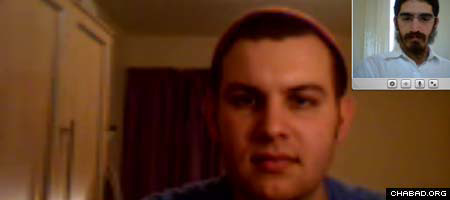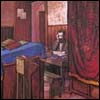The first time that Shirley Marrable lit Shabbat candles, she was unsure if she was doing everything right. Though she was born Jewish, the 45-year-old Northampton, England native had been raised Catholic and grew up in a world of church-based services and bible studies, completely uninformed about her Jewish roots. When she stood in front of the candles and stumbled over the Hebrew blessings, she wondered what her children – who both attended church – were thinking of their mother's embrace of her long lost identity.
When Jay and Rachel Roth welcome Shabbat into their Chicago home, their memories of growing up in synagogues in Arizona serve as a vague backbone. Both beset with challenging disabilities, they cherish any insight that can spark their newfound Jewish involvement, which began just one year ago.
Though an ocean separates these two homes, they both attribute their sprouting Jewish pride to a single force: the Jewish Learning Network, or JNet.
A division of Merkos L'Inyonei Chinuch, the educational arm of Chabad-Lubavitch, JNet launched two years ago with funding from a generous grant by the Rohr Family Foundation. It matches curious students around the globe with learned volunteer teachers for phone-based study sessions.
According to organizers, it provides a convenient opportunity for people to explore their Jewish heritage.
The goal, says JNet director Rabbi Berel Frankel, is "to bring one-on-one learning to everyone, wherever they are."
Thus far, the program has matched more than 1,500 people with their own personal teachers. Rabbi Yehuda Dukes, its coordinator, says that JNet is reaching out to a whole class of people left untouched by traditional methods of Jewish education.
"There are people out there who are unable to attend classes because they are busy or they live in remote places," he explains. "They need individualized attention in order to study and grow."
No one knows this better than the Roths.
Where to Turn
Married for 35 years, Jay and Rachel Roth spent many years trying to increase their affiliation with the Jewish community, but were turned off by what she calls "pay to pray" synagogues – houses of Jewish worship operating under a standard model of yearly, sometimes expensive, membership dues – and communities that didn't seem so spiritual. They sent their children to local Hebrew schools, but gave them Bar Mitzvahs in hotel ceremonies without the help of a rabbi or synagogue.
In the late 90s, however, their energy turned to their declining health. A veteran of the Vietnam war, Jay Roth suffers from Post-Traumatic Stress Disorder; in 2000, Rachel Roth was diagnosed with Parkinson's disease. They both walk with the aid of canes and keep peculiar sleep-awake cycles.
Over the years, although their hunger and curiosity for Judaism returned in earnest, their disabilities did not allow them the time, the means or the energy to devote to the study of their religion and heritage.
"We were so interested," relates Rachel Roth, "but it just wasn't happening."
Then, just over a year ago, a late night evening of Internet surfing led them to JNet.
"It was a total accident," she says.
They immediately saw the service as a unique opportunity.
"There was a great need to learn," she explains. "And at our age and with our disabilities, it wasn't going to be easy. So the idea of having our own phone-study partner was amazing."
An added bonus, she points out, is that the learning is free.
After signing up online, they were contacted by Dukes, who set them up with Bentzion Treitel, a young newlywed and Chabad-Lubavitch yeshiva graduate living in Brooklyn, N.Y.
"Everybody in this country should take a lesson from JNet," asserts Jay Roth. "When you e-mail or call, they call you right back. They act promptly and respond. You call and they're there."
In no time, the couple were learning about the Haggadah, the special book outlining the Passover Seder, with Treitel.
"Passover was my father's favorite holiday," says Rachel Roth. "But I had forgotten so much about it, and there was so much I never even knew."
Their grasp of subjects grew and they steadily added on to their regimen, including looking at the weekly Torah portion, examining the Jewish holidays, discussing about Judaism's strict dietary laws and learning about prayer and the Code of Jewish Law.
"For me, it was like walking in the footsteps of my grandmother, who perished in the Holocaust," she says. "I feel like I am carrying on the tradition of something that she never got to live."
Jay Roth, who has a case of short-term memory loss, views his weekly phone sessions with Treitel as the only way for him to stay connected to Judaism.
"It's very difficult for me to retain information," he describes, "so I really learn for the moment. And because of my anxiety, anything that I can derive comfort from is a good thing.
"Bentzion's reaction to this need is amazing," he continues. "He understands that if I don't remember something it's not because I wasn't listening. He takes the time to discuss things thoroughly and is extremely tolerant."
Though many religious practices seem too complex for Roth to master, he relishes in his ability to put tefillin on every day, made possible by a gift from an anonymous donor made possible through JNet.
"Tefillin is something I realized I could do in my own home," he explains. "I can do it without compromising the anxieties and disorders I have. I can do it overlooking a window."
Am I Jewish?
For Shirley Marrable, her weekly study sessions are reviving a Jewish life that her mother and grandmother chose not to live. Her grandfather had been Roman Catholic, and made all the men in the family promise that whomever they chose to marry would assume the life of a Roman Catholic. For decades, even though her grandmother and mother were Jewish, they all took on the religion of their husbands, leading Christian lives and completely rejecting their Jewish roots.
After contacting JNet, however, Marrable is breaking the family promise.
"Subconsciously, I knew I was Jewish," says Marrable. "I remember meeting some Jewish cousins, but that's about it. It was never talked about."
She started searching in earnest when her sister, who was also investigating the Jewish roots of the family, told her about Chabad.org. She posted a question on the Web site's Ask the Rabbi page got the ball rolling: "I recently found out I have a Jewish mother. What does this mean for me?"
Chabad.org put her in touch with JNet, where Gilah Evers, a Chabad-Lubavitch emissary who has been serving the Jewish community in Amersfoort, Netherlands, for 25 years, provided the answer to Marrable's question. Yes, she was Jewish, and had found a world of support.
"Shirley needed someone to guide her with the basics, so I thought that Gilah's experience as a Chabad emissary would make it a great match," explains Dukes.
During their first phone meeting, Marrable told Evers: "Okay, I know nothing. You have to go back to what you would teach babies."
More than a year later, Marrable says that she has learned all about "how to live a Jewish life," including the meaning of Shabbat, candle lighting, how to keep kosher, the daily prayers and blessings on food. She is proud to report that this was the second year that she has lit the menorah for Chanukah.
Marrable says that she feels blessed to have Evers as her personal guide.
"It's been amazing having someone to ask questions," says Marrable. "I have my own teacher constantly steering me in the right direction."
For her part, Evers says she is inspired by Marrable's energetic commitment.
"As soon as we learn something, Shirley is practicing it," she says.
"She is so excited about it."
Looking towards the future, both Marrable and the Roths see JNet continuing to play a vital role in their Jewish learning.
"With our health, we have to take it one day at a time," admits Rachel Roth. "But our minds are being opened up to so many things and we're embracing the learning process. JNet listens, guides, and they are wonderful communicators. They never let us down."
After discovering a synagogue a short drive away from her home, Marrable has plans to make her kitchen kosher and wants to "attempt" a Passover Seder this year.
"The more I learn the more I realize there is more to know," she says, "It's never-ending."









Start a Discussion